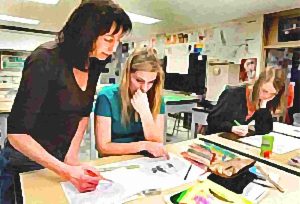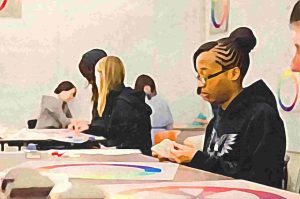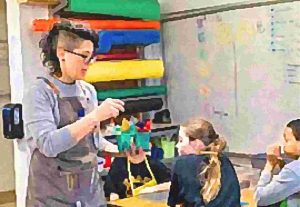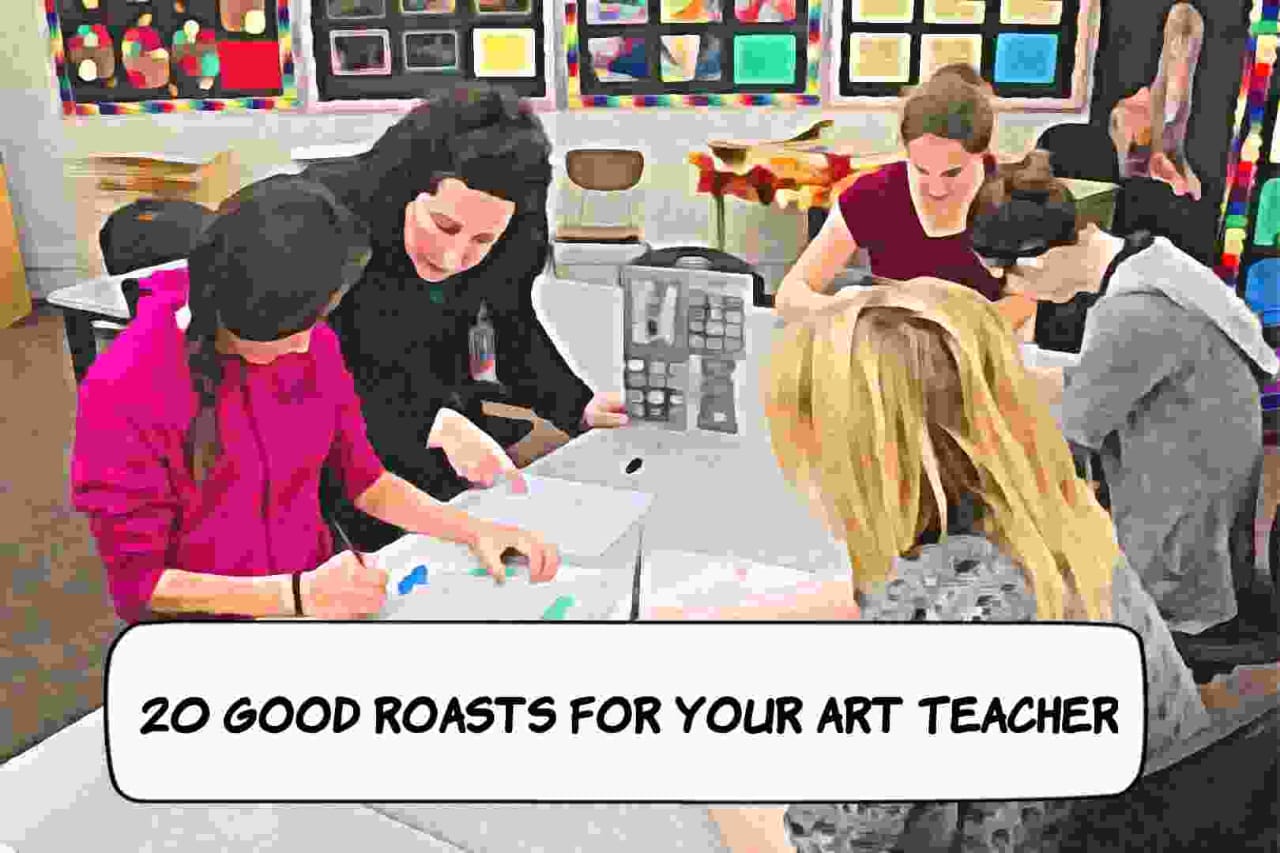There’s no humour as ruthless as the ones we make in high school. But unlike classmates, roasting against teachers requires another level of witticism.
If you’re looking for perfect punchlines to burn your art teacher, this article is for you.
I will walk you through 20 of the most sassy yet humorous lines that you can say to your art teacher that will throw the entire class into a frenzy, especially when you want to roast them against feedback on your attempt in class.
List of 20 Good Roasts For Your Art Teacher
1. “I’m painting to express myself, you are teaching to impress.”

Take a little dig at your art teacher with this sassy line. It says that when you paint, you do it to express your feelings and ideas.
But when the teacher teaches, it seems like they’re more interested in showing off their skills and looking impressive rather than helping you express yourself.
It’s a bit like saying you’re in the class to share your emotions through art, but your teacher is just trying to show off in class.
- “I paint to express; you teach to impress.”
- Every one can agree that your teaching is all about thee but my art speaks for me
2. “Are you sure you’re an art teacher? I’ve seen better creativity in a colouring book.”
Drop this line to undermine the teacher’s artistic abilities cleverly. It means your art teacher’s creative skills are so basic that even a colouring book surpasses them.
It’s like saying your teacher is not doing a great job as an art teacher, and even a simple colouring book is more imaginative than their work.
- “Is this art class or a colouring kindergarten?”
- “I thought art teachers were supposed to be the creative ones.”
3. “If I wanted to hear abstract theories, I’d attend a philosophy class, not art.”
Use this classic line to challenge your art teacher’s teaching style. It’s a playful way of pointing out that the art teacher might be focusing too much on theories instead of practical art skills.
- “I wanted art, not a philosophy lesson.”
- “I came for painting, not abstract talks.”
4. “Can’t we just paint? Must we have to decipher hieroglyphics because of your critique.”
This is a perfect rebuttal when your art teacher gives you insulting feedback on your attempt. It’s a clever way of telling your art teacher that you want more straightforward feedback.
It’s as if you’re saying their comments are so complicated that it feels like deciphering ancient Egyptian symbols.
The use of “hieroglyphics” adds a funny touch, suggesting their feedback is overly complex.
- “I paint, don’t puzzle. Keep it simple.”
- “Art, not a tricky crossword. Easier feedback, please.”
5. “Your teaching methods are just behind the times.”

Call out your art teacher’s style of teaching. It means the teacher’s instructions are conventional and old-fashioned.
It’s a witty way of asserting your creative superiority and subtly critiquing your art teacher’s approach without directly attacking them.
- “I’m super modern; your methods are so last season.
6. “Is your favourite colour beige? Because your feedback is pretty neutral.”
Throw out this punchy line to call out the monotony and lack of vibrancy in the teacher’s feedback.
This is like a playful way of saying your art teacher’s comments are a bit boring and don’t give much information.
Beige is a colour that’s kind of dull and doesn’t stand out much, so it’s used here to suggest that the teacher’s feedback is similar – not very exciting or helpful.
- “Is beige your top pick? Your feedback sure matches.”
- “Neutral vibes like beige – is that your art critique strategy?”
7. “Are you teaching art or giving a stand-up comedy routine? I can’t tell.”
Many art teachers would force themselves to be funny in the hope that you find the class interesting.
If this annoys you, this line is a perfect roast. It’s a playful way to suggest that maybe the teacher’s style is more focused on making people laugh than on teaching serious art stuff.
- “Is this an art class or an open mic night? Your teaching style has me confused.”
- “I signed up for art, not a comedy special. Can we get to the serious strokes, please?”
8. “Preschool finger-painting class tells of more creativity than yours”
Compare your teacher’s work with something silly to get at them. This is like saying your art teacher’s job is not very imaginative.
It’s comparing their art to what little kids do with finger paints in preschool, suggesting that even those simple paintings by kids are more creative than what your teacher comes up with.
9. “I’m painting outside the lines because I’m taking your teaching style as inspiration.”
Playfully tease your art teacher with this line. While it’s not really a complex roast, it suggests that your teacher’s way of teaching is so unique or different that it has influenced you to be unconventional in your art, like painting outside the lines.
It’s like saying, you’re doing something different in my art because you’ve learned from their quirky and unusual teaching style.
- “I’m being a little Picasso, inspired by you!”
- “Breaking rules in art, just like you taught me.”
10. “Is this class about art or just being bored?”

Let it be known that the art class is not as engaging or stimulating as it should be. It’s making fun of the idea that the class might be dull instead of fun and creative.
You can even ask it as a straightforward question if the class is about art or boredom.
11. “Has any of your art ever been auctioned?”
Subtly suggest that your art teacher’s work may not be highly valued or in demand.
Auctions are places where people bid on valuable and famous artworks, so by asking this question, you’re implying that your teacher’s art may not be at that level.
- Your art should be hanging in galleries, not waiting for invite.
12. “Perhaps, I should consider auctioning your feedback off as performance art.”
Make a playful joke about your art teacher’s comments. It’s saying that the teacher’s feedback is so unique and different that it could be sold as a form of art.
It’s sarcasm you can use when you are not happy with the overwhelming feedback of your art teacher on your attempts.
So, you sarcastically suggest that the teacher’s feedback is so valuable it could be sold if framed like a piece of art.
13. “Is there a ‘Most Vague Feedback’ award? Because you’d be a strong contender.”
Use this line as a playful way to tell your teacher that their feedback is not very clear without being too harsh.
The joke is in imagining this funny award and suggesting that your teacher would be really good at winning it because of the unclear feedback they give.
14. “I thought this was an art class, not a lesson in how to be mysteriously unhelpful.”
Critique the teacher’s supposed lack of guidance or assistance. It means that instead of learning about art, it feels like the teacher is being intentionally unhelpful or not giving enough guidance.
The word “mysteriously” is used to make it sound a bit funny as if the teacher is keeping their unhelpfulness a secret.
- I signed up for art, not a crash course of unhelpfulness
15. “My art may be a work in progress, but at least it’s not as much of a mystery as your grading criteria.”

Tell your art teacher to appreciate your effort instead of grading you inconsiderately.
The roast is that even though your art is not perfect, it at least makes sense and has a direction, unlike the grading criteria used by your teacher, which seems unclear or puzzling.
The humour comes from the playful comparison between the evolving nature of your art and the potential confusion in how your teacher evaluates it.
16. “If creativity is a crime, then call me a mastermind because your critiques are a real masterpiece of confusion.”
Playfully make fun of your art teacher with this comparison. It suggests that if being creative is considered a “crime” by the teacher, then you want to be seen as an innovative “mastermind.”
The twist is that instead of praising the teacher’s critiques, you call them a “masterpiece of confusion,” implying that the comments are so confusing that they are a work of art.
- Everyone is confused about your critique, only you thinks it’s a masterpiece.
17. “I asked for feedback, not a riddle.”
Imagine you’re showing your artwork to your art teacher, expecting some clear feedback.
However, the teacher’s comments seem confusing, like they’re speaking in riddles instead of giving you straightforward advice.
So, when you say, “I asked for feedback, not a riddle,” you’re humorously expressing that you wanted simple and helpful suggestions, not something mysterious or hard to understand.
- “I wanted critique, not a puzzle.”
- “Feedback, not riddles, please.”
18. “Colors on canvas, not confusion in class.”
Put the art teacher in their place by calling out their shortcomings. This sends the idea that the art teacher excels in creating vibrant and visually appealing artwork on canvas but falls short when it comes to maintaining order and clarity in the classroom setting.
- “Great with paint, not so much with restraint.”
- “Awesome art, but class is a little apart.”
19. “So you’re teaching the art of being constantly rejected?”
Make fun of the profession like it’s a last resort for a failed career. This line is trendy, but it remains classic.
You can say this line when your teacher is trying to be mean to you, and this will put them in their place.
- What truly inspired you to become an art teacher?
- Shouldn’t you be doing something museumy?
20. “I wanted to roast you, but ‘Art’ and ‘teacher’? You are already self-roasted.”
This line is another clever way of poking fun at your art teacher.
The joke is that the teacher’s art is so bad or unusual that it’s like they’ve roasted themselves.
It means that the teacher’s artistic abilities are so lacking or unconventional that they don’t need an external roaster; their art itself is a source of self-mockery.

Leave a Reply